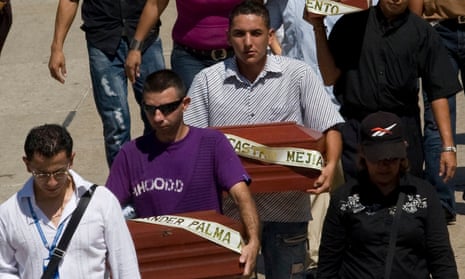Gloria Astrid Martínez last saw her son on the morning of 8 February 2008. After breakfast, Daniel, 21, left their home in Soacha, a downtrodden suburb of Colombia’s capital, to start a new job working on wealthy countryside estates.
“He told me he found a job that would pay so much I wouldn’t have to work any more,” recalled Martínez. “It sounded too good to be true, but he insisted, so he left.”
Eight months later, Daniel’s body was found clothed in jungle fatigues in a mass grave near the Venezuelan border. Soldiers from the Colombian army had lured Daniel with the promise of work to the city of Ocaña, 414 miles from Bogotá, where they murdered him and declared him a rebel fighter in order to boost their statistics in the war against leftist insurgents.
The inflated figures, dubbed “false positives”, were used to justify US aid military packages while the officers who carried out the executions were rewarded with promotions and time off.
When news of the killings first broke 2008, the scandal engulfed the Colombian military: dozens of senior officers were fired, and many rank-and-file soldiers went to prison.
But a new study co-authored by a former police colonel alleges that the practice was far more widespread than previously reported: according to authors Omar Rojas Bolaños and Fabian Leonardo Benavides, approximately 10,000 civilians were executed by the army between 2002 and 2010 – more than three times the number tallied by human rights groups.
In their book Extrajudicial Executions in Colombia, 2002-2010 – Blind Obedience in Fictitious Battlefields, the authors describe how Colombia’s army systematically killed civilians to boost their body counts.
“We can call them ‘false positives’ or ‘extrajudicial executions’, but really these were cold-blooded murders,” said Rojas, who previously served 31 years as a police officer. “They were meticulously planned and carried by all ranks.” Rojas said disabled boys were specifically targeted because of their vulnerability as well as a handful of military men who were suspected of whistleblowing.

“This isn’t just something that happened in the past: we are still finding ‘false positive’ cases today,” Rojas said. “It’s not with the same intensity as before, and now they call them ‘military errors’.”
Colombia’s largest rebel group, the Revolutionary Armed Forces of Colombia (Farc), signed a peace deal with the government in November 2016, formally ending 52 years of civil war that left 220,000 dead and over seven million displaced, mostly civilians. State-aligned paramilitaries and other leftwing groups contributed to the bloodshed, with atrocities committed by all sides.
President Juan Manuel Santos – who was awarded the Nobel peace prize for shepherding through the deal – served as defense minister from 2006 until 2009, at the the height of the “false positive” killings.
Activists say neither Santos nor his predecessor Álvaro Uribe have been called to account over the scandal, though Uribe faces several separate investigations over alleged war crimes. A key witness in one case was murdered in Medellín last month.
Colombia’s government has often brushed off the scandal as the actions of a few rogue individuals.
“‘False positives’ were not just a problem of a few bad apples,” said José Miguel Vivanco, Americas director at Human Rights Watch. “These apparently widespread and systematic extrajudicial killings were committed by troops attached to virtually all brigades in every single army division across Colombia.”
The soldier who recruited Daniel is currently serving a 39-year sentence, along with many other middle and low ranking officers. But not a single general has been convicted.
For Martínez, who has received death threats over her fight for justice, the impunity is galling.
“They say the pain of loss gets easier everyday but that’s a lie, it gets worse,” she said, her voice cracking. “The state should protect its people, not kill them.”
